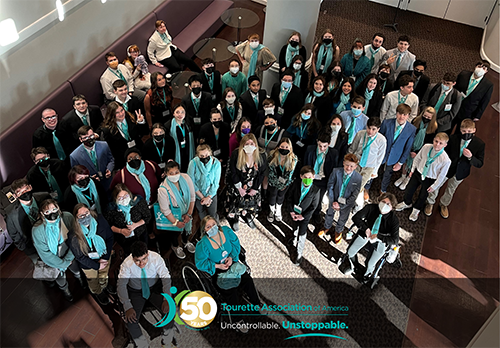Empowering Young People with Tourette: Youth Leaders Helping Themselves and Others

Learn about the CDC-Tourette Association of America’s partnership on youth programs
Having Tourette syndrome or another type of tic disorder can be hard on young people. Children with Tourette syndrome may not always get the diagnosis and care they need when they need it, and most have other mental, emotional, or behavioral disorders along with Tourette syndrome.
Tics can be disruptive to other people, who may react poorly, particularly if they don’t understand what it is like to have tics or why a person can’t just stop doing them. Children with Tourette syndrome are more likely to be victims of bullying than their peers. The challenges with being accepted and the resulting stress put their long-term health and well-being at risk.
CDC partners with the Tourette Association of America (TAA) on the Tourette Outreach and Education Program to raise awareness and provide evidence-based education about tics and Tourette syndrome. Supporting young people’s health and well-being is the key goal for this work.
Programs for Young People with Tourette Syndrome
To help young people directly, an important part of the CDC-TAA partnership is the Youth Ambassador and Rising Leader program. Youth Ambassadors (for ages 12–17) and Rising Leaders (for ages 18–25) receive training on going into their communities and sharing their stories. Often these stories are personal ones about having tics or Tourette syndrome. But anyone who is dedicated to educating the public about Tourette syndrome and tics can be part of the Youth Ambassadors and Rising Leaders program, even people without Tourette syndrome or tics.
Youth Ambassadors and Rising Leaders follow a train-the-trainer model. This means
- New Youth Ambassadors and Rising Leaders get formal leadership training and mentoring opportunities over the year-long program, and
- Youth Ambassadors and Rising Leaders serve as mentors, co-trainers, and speakers in meetings that begin the next cycle of training.
To fill a need articulated by many parents of young children with Tourette syndrome, the TAA has developed a pilot Junior Youth Ambassador Program. This expansion will engage children ages 5-11 years, together with their parent or guardian, in educational sessions. These sessions will help them learn about their condition and develop skills to share their knowledge with teachers, peers, and others. This program will be a new first step in the journey toward becoming a Youth Ambassador and Rising Leader.
Learn more about how to participate in TAA’s youth programs.
What the Program has Meant to People
Youth Ambassadors and Rising Leaders say that participating in the program has been a transformative experience for them. Some say the program helped them feel empowered to tell their story about living with Tourette syndrome. Others say the program was important because it gave them the opportunity to meet other young people with Tourette syndrome, and this helped them feel supported and less isolated. Youth Ambassadors and Rising Leaders say they have been inspired by the stories shared by mentors who overcame challenges they have faced. Many say finding their voice makes them feel powerful! Here are some real examples of what leaders say and how they help others.
CDC’s Work on Tourette Syndrome
CDC is working with researchers to expand our knowledge of Tourette syndrome, how it affects people’s lives, and how we can advance public health efforts to improve the lives and health of people with Tourette syndrome. This work includes
- Increasing awareness and understanding of Tourette syndrome:
- In addition to programs for youth, CDC is partnering with TAA to provide health education and training to healthcare providers, educators, and families about Tourette syndrome.
- Developing and disseminating information on best practices for caring for and living with Tourette syndrome:
- CDC funded TAA to create tool kits for healthcare providers, individuals, and families to improve their knowledge and skills.
- Improving access to quality care for people with Tourette syndrome:
- CDC supports TAA in publicizing the Comprehensive Behavioral Intervention for Tics (CBIT), which is a behavioral treatment that helps many people manage their tic symptoms.
- Learning more about Tourette syndrome and other tic disorders by funding and supporting research:
- Studies on the development of better screening tools so we can diagnose Tourette syndrome and other tic disorders earlier
- Studies to help better understand how many people have Tourette syndrome and other tic disorders, how they are treated, and how they impact children and families.